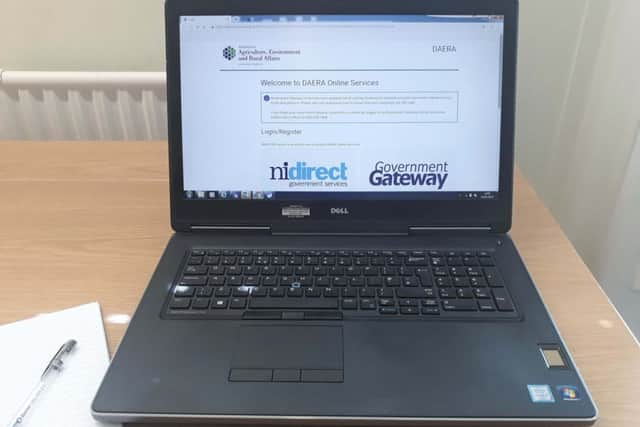DAERA Notes: Information technology


Are you good at managing the paperwork associated with your farm business or do you feel weighed down by a paper mountain? Benefits of managing your farm data electronically:
Accessibility - it can take time to find and access paper records, whereas accessing electronic records is almost instantaneous. There are many ways to ask the device to search for information, if it’s not stored where you originally thought, for example by animal identifier or fertiliser name.
Advertisement
Hide AdAdvertisement
Hide AdSharing - having your farm records stored electronically means it is much easier to share them with others, such as farm business members, farm advisers, bank managers and your vet.


Transferring - electronic data unlike paper records can be easily transferred between systems. This reduces the amount of time required to enter in data. The principle being enter data once, reuse many times.
Updating - version control is simple with electronic records, you can see who has made changes to a record, when the change was made and what the records looked like before the change. Updating and keeping track of latest versions is more cumbersome on paper. DAERA’s online Single Application Form (SAF) allows you to review and update your application if you wish to make changes after your initial submission.
Processing – a key benefit of electronic data recording is the ability to process the data into information which you can then analyse to help you make management decisions about your farm business.
Advertisement
Hide AdAdvertisement
Hide AdBacking up - with paper records you really are putting ‘all your eggs in one basket’. If your paper records are destroyed, for example by fire, flood or stolen this could mean you lose your information for good. It is true electronic data can be corrupted by computer viruses but the benefit of electronic data is that it is easier to back up the data to other locations whether that is physical or cloud storage, reducing the risk of permanent data loss.
Examples of electronic data recording:
Electronic Identification (EID) tags
Using EID tags to identify your animals has many advantages. EID tags facilitate and simplify the collection of data as the tag is read by an electronic reader. This reduces the time required to identify an animal and minimises human errors. It is also less stressful for the animals and safer for you. The real benefit of EID tags is when you integrate the tags with other IT systems, such as electronic weighing systems and automated parlour systems. Regularly capturing animal data easily and accurately allows you to continuously monitor the performance of your animals and make decisions for your farm business to improve profitability.
CAFRE benchmarking
With the introduction of ‘Making Tax Digital’ and the requirement for businesses to keep electronic records and submit tax returns electronically, it is now even easier to participate in benchmarking. CAFRE benchmarking helps you assess your own business performance. You can compare your physical and financial results with previous years, other similar farms and industry standards. The benchmarking system produces an overall farm report and a financial and physical report for each enterprise on the farm. This will help identify reasons for variation, highlight where improvements can be made and provide information to set realistic targets for your farm business.
Farm management software
Farm management software systems allow users to integrate data from various sources, for example APHIS, Dairy Parlour, Weighbridge, vet, accounts and analyse this data in a way that helps you make decisions which will benefit the farm business.
Advertisement
Hide AdAdvertisement
Hide AdWhatever level of electronic data recording you have on the farm, whether you use simple spreadsheets or invest in bespoke farm management software packages, entering, processing and analysing your farm data electronically can ultimately help you analyse your farm data efficiently and effectively in order to make the right decisions for your business.